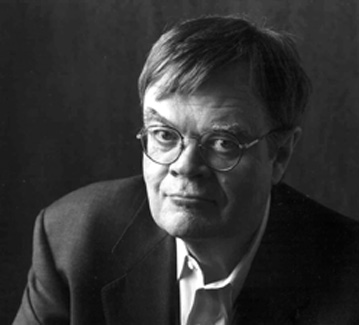
Garrison Keillor
I was listening to Garrison Keillor’s Prairie Home Companion this past weekend and marveling yet again at his ability to pull me into his stories about the Lake Woebegone citizenry. His account of a school field trip may have been a summer repeat—I’m not sure because I came into the program late. In any event, it was about a woman’s hope that poetry would stave off society’s seemingly inevitable slide into dissolution. In other words, it touched on one of the major themes of this website.
In the story, the feminist wife of the Lutheran pastor is upset at the direction young people seem to be going. Her reflections occur as she is returning from a trip to Minneapolis that she has been chaperoning. Her daughter is purchasing a $200+ cashmere sweater because she has been invited (the only sophomore!) to join an exclusive group of 12 girls whose major activity is practicing all year to dance to “To Know, Know, Know You Is to Love, Love, Love You” in high heeled pumps and short skirts at the school’s talent show. Meanwhile, all the students on the bus, rather than talking to each other or even acting up, are instead lost in their various electronic worlds. And she is trying to write a poem that she wants to enter into a contest for the wives of Lutheran ministers.
What can she say to them, and what can she say to her daughter, that will cause them to begin living their lives with passion, purpose and commitment?
Her answer is to have the bus driver stop the bus in the middle of the countryside so that she can get up and recite a poem. I don’t have the words to it here, but it is a slight variation of A. E. Houseman’s beautiful poem “Loveliest of All Trees, the Cherry”:
Loveliest of trees, the cherry now
Is hung with bloom along the bough,
And stands about the woodland ride
Wearing white for Eastertide.
Now, of my three score years and ten,
Twenty will not come again,
And take from seventy springs a score,
It only leaves me fifty more.
And since to look at things in bloom
Fifty springs are little room,
About the woodlands I will go
To see the cherry hung with snow.
Her version replaces “twenty” with “sixteen” (the age of the students on the bus) and she makes some other changes. The point is to remind the students that time is precious, especially when one is young and the cherry trees are blossoming. This time of life should be like entering into the Easter promise clothed in white. The simplicity of the poem says it all. To live these years in any way other than with wonder, love, and praise is a waste. Certainly one should not bury oneself away in blackberries, cell phones, and vapid peer groups.
How do the students respond? Some look bored, some look vaguely interested, some are so lost in their headsets that they don’t even notice. Her daughter looks at her feet and pretends that she doesn’t know this woman.
The bus driver, on the other hand, is profoundly moved. When the trip comes to an end, he looks at her with tears in his eyes and thanks her. So maybe her poem, thrown like a bottle into the ocean by a shipwrecked mariner, has touched at least one person. Except that (through wonderful use of comic deflation), Keillor has her realize, from the smell of the man’s breath, that he has been drinking. So even this small victory is qualified.
I wonder how Garrison Keillor would respond to this website. On the surface I anticipate studied casualness: “You say that great literature can change a life? Maybe. It’s worth a try anyway. Maybe it will make a little difference. Maybe. But don’t get your hopes up.”
Underneath, however, I hear his passionate prayer: “I hope to God it will!”